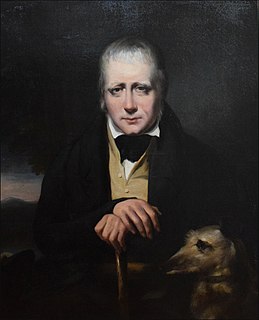
Sir Walter Scott, 1st Baronet, was a Scottish historical novelist, poet, playwright and historian. Many of his works remain classics of European and Scottish literature, notably the novels Ivanhoe, Rob Roy, Waverley, Old Mortality, The Heart of Mid-Lothian and The Bride of Lammermoor, and the narrative poems The Lady of the Lake and Marmion. He had a major impact on European and American literature. As an advocate, judge and legal administrator by profession, he combined writing and editing with daily work as Clerk of Session and Sheriff-Depute of Selkirkshire. He was prominent in Edinburgh's Tory establishment, active in the Highland Society, long a president of the Royal Society of Edinburgh (1820–1832), and a vice president of the Society of Antiquaries of Scotland (1827–1829). His knowledge of history and literary facility equipped him to establish the historical novel genre and as an exemplar of European Romanticism. He became a baronet "of Abbotsford in the County of Roxburgh", Scotland, on 22 April 1820; the title became extinct on his son's death in 1847.
Forgotten Realms is a campaign setting for the Dungeons & Dragons (D&D) fantasy role-playing game. Commonly referred to by players and game designers alike as "The Realms", it was created by game designer Ed Greenwood around 1967 as a setting for his childhood stories. Several years later, Greenwood brought the setting to publication for the D&D game as a series of magazine articles, and the first Realms game products were released in 1987. Role-playing game products have been produced for the setting ever since, as have various licensed products including novels, role-playing video game adaptations, and comic books.
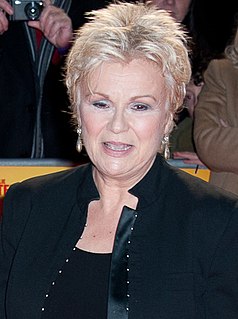
Dame Julia Mary Walters, known professionally as Julie Walters, is an English actress, author, and comedian. She is the recipient of four British Academy Television Awards, two British Academy Film Awards, two International Emmy Awards, a BAFTA Fellowship, and a Golden Globe. Walters has been nominated twice for an Academy Award: once for Best Actress and once for Best Supporting Actress.

John Cowper Powys was an English philosopher, lecturer, novelist, critic and poet born in Shirley, Derbyshire, where his father was vicar of the parish church in 1871–1879. Powys appeared with a volume of verse in 1896 and a first novel in 1915, but gained success only with his novel Wolf Solent in 1929. He has been seen as a successor to Thomas Hardy, and Wolf Solent, A Glastonbury Romance (1932), Weymouth Sands (1934), and Maiden Castle (1936) have been called his Wessex novels. As with Hardy landscape is important. So is elemental philosophy in his characters' lives. In 1934 he published an autobiography. His itinerant lectures were a success in England and in 1905–1930 in the US, where he wrote many of his novels and had several first published. He moved to Dorset, England, in 1934 with a US partner, Phyllis Playter. In 1935 they moved to Corwen, Merionethshire, Wales, where he set two novels, and in 1955 to Blaenau Ffestiniog, where he died in 1963.
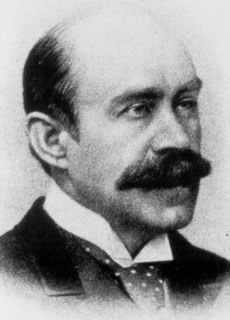
Walter Horatio Pater was an English essayist, art and literary critic, and fiction writer, regarded as one of the great stylists. His first and most often reprinted book, Studies in the History of the Renaissance (1873), revised as The Renaissance: Studies in Art and Poetry, in which he outlined his approach to art and advocated an ideal of the intense inner life, was taken by many as a manifesto of Aestheticism.
The Social Gospel is a social movement within Protestantism that applied Christian ethics to social problems, especially issues of social justice such as economic inequality, poverty, alcoholism, crime, racial tensions, slums, unclean environment, child labor, lack of unionization, poor schools, and the dangers of war. It was most prominent in the early-20th-century United States and Canada. Theologically, the Social Gospelers sought to put into practice the Lord's Prayer : "Thy kingdom come, Thy will be done on earth as it is in heaven". They typically were postmillennialist; that is, they believed the Second Coming could not happen until humankind rid itself of social evils by human effort. The Social Gospel was more popular among clergy than laity. Its leaders were predominantly associated with the liberal wing of the progressive movement, and most were theologically liberal, although a few were also conservative when it came to their views on social issues. Important leaders included Richard T. Ely, Josiah Strong, Washington Gladden, and Walter Rauschenbusch.
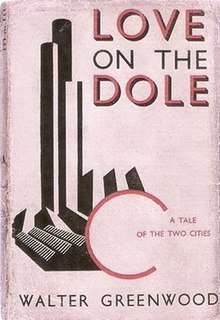
Love on the Dole is a novel by Walter Greenwood, about working class poverty in 1930s Northern England. It has been made into both a play and a film.
Walter Greenwood was an English novelist, best known for the socially influential novel Love on the Dole (1933).

The Wonderful Wizard of Oz is a 1910 American silent fantasy film and the earliest surviving film version of L. Frank Baum's 1900 novel The Wonderful Wizard of Oz, made by the Selig Polyscope Company without Baum's direct input. It was created to fulfill a contractual obligation associated with Baum's personal bankruptcy caused by The Fairylogue and Radio-Plays, from which it was once thought to have been derived. It was partly based on the 1902 stage musical The Wizard of Oz, though much of the film deals with the Wicked Witch of the West, who does not appear in the musical.
Mirkwood is a name used for a great dark fictional forest in novels by Sir Walter Scott and William Morris in the 19th century, and by J. R. R. Tolkien in the 20th century. The critic Tom Shippey explains that the name evoked the excitement of the wildness of Europe's ancient North.
Under the Greenwood Tree is a 1929 British historical drama film directed by Harry Lachman and starring Marguerite Allan, Nigel Barrie and Wilfred Shine. It is an adaptation of the 1872 novel Under the Greenwood Tree by Thomas Hardy.
Greenpark Productions Ltd is a British documentary film production company, founded by Walter Greenwood in Polperro, Cornwall in 1938. The company relocated to London in 1939. After the war it expanded into making upmarket corporate films. Amongst its roster of directors were Ken Annakin, Ralph Keene and Humphrey Swingler, brother of the poet Randall Swingler.

Only Mugs Work is a 1938 melodromatic crime novel by the British writer Walter Greenwood. Greenwood had established his reputation in 1933 with Love on the Dole, set in a district closely modelled on working-class Salford. In this case the setting is shifted to London's Soho, but features a similar blend of realism and drama. It is set amongst the spivs of the capital city. It was one of a number of novels that focused on the activities of the London underworld in the late 1930s including There Ain't No Justice, The House in Greek Street and Night and the City.

Saturday Night at the Crown is a 1959 novel by the British writer Walter Greenwood. It was his final novel, inspired by his 1954 play of the same title. The play had premiered in Morecambe in 1954 before running for 234 performances at the Garrick Theatre in London's West End from 1957 to 1958. He dedicated to the novel to Thora Hird who had starred in the play.

So Brief the Spring is a 1952 novel by the British writer Walter Greenwood. It is the first in the author's trilogy set in the fictional fishing port of Treeloe in Cornwall. It was developed out of a play which Greenwood had written in 1945. The novel is dedicated to Robert Newton who appeared in the play. It focuses on Randy Jollifer, formerly of the Royal Navy, attempting to settle down to postwar life in his home town. The book and its sequels sold steadily, without enjoying the spectacular popularity of his best-known work Love on the Dole.
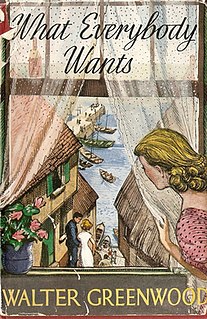
What Everybody Wants is a 1954 novel by the British writer Walter Greenwood. It is the second of a trilogy set in the fictional fishing port of Treeloe in Cornwall during the postwar years. While the principal character of the first novel Randy Jollifer reappears, there is a shift to focus on the life of Darky Durrant. Durrant is a local poacher of gypsy heritage who, despite a distinguished war record as a commando, lives on the margins of society.

The Secret Kingdom is a 1938 novel by the British writer Walter Greenwood. Like his best-known novel Love on the Dole it is set in Salford. It portrays the working-class socialist Byron family, and particularly the eldest daughter Paula who tries to establish an independent identity after finding working a parlour maid. She encounters Bert Treville in nearby Manchester and the two begin a courtship. After his death due to heavy drinking, she brings up her son Lance as a single-mother, throwing her effort into her talented child she is vindicated when he emerges as a talented concert pianist - performing on national radio in the final scene.

His Worship the Mayor is a 1934 novel by the British writer Walter Greenwood. It was his second novel, following on from the success of his bestselling debut Love on the Dole the previous year. His new work drew on his experience as a Labour councillor, and focuses on corruption in local government a theme also addressed in Winifred Holtby’s South Riding. The novel features Sam Grundy, the bookmaker who had appeared in Love on the Dole.
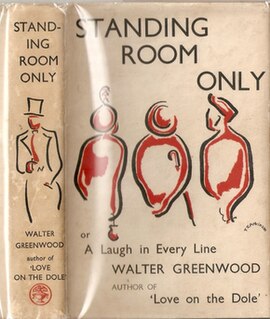
Standing Room Only is a 1936 comedy novel by the British writer Walter Greenwood. It was his third novel. Like his previous two, including his bestselling debut Love on the Dole, the work is partly set in his native Salford. The novel was somewhat self-reflexive as the protagonist Henry Ormerod strongly resembles Greenwood's own background and experiences. It was not as critically well-received as his two previous novels.
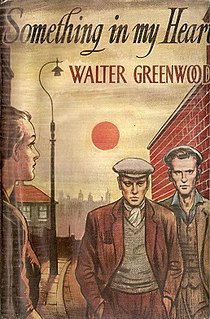
Something in My Heart is a 1944 novel by the British writer Walter Greenwood. It is a loose sequel to his debut and best-known novel Love on the Dole, a 1933 work set in Salford at the height of the Great Depression. This book presented a more optimistic view of a potential postwar future that was absent in the despair in the original novel.














